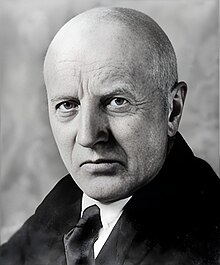Kazimir Petrovich Kalitsky
Kazimir Petrovich Kalizki ( Russian Казимир Петрович Калицкий ; born March 4 . Jul / 16th March 1873 greg. In St. Petersburg ; † 28. December 1941 in Leningrad ) was a Russian geologist , and university teachers .
Life
Kalizki's father, Pyotr Wikentjewitsch Kalizki, was a field warden and died in 1876. The mother Luisa Pawlowna was a merciful sister and in 1881 had to give her son a home where he lived and studied until 1888. In his spare time he always read and learned German .
Kalizki studied at the St. Petersburg Mining Institute with graduation in 1899. In 1901 he began work in the Geolkom ( Geological Committee of the All-Russian Geological Institute). He carried out numerous geological surveys in Central Asia , the Caucasus and other petroleum areas. He developed a method using structured maps for oil prospecting . He developed a theory of the origin of petroleum. At the Mining Institute he gave a lecture on the geology of petroleum.
After the October Revolution , Kalitski was elected head of the Geolkom's petroleum section in 1920. In 1921 his textbook on the geology of petroleum was one of the first to appear.
When Geolkom members were arrested in 1929 for belonging to an organization for counterrevolution and espionage ( Geolkom case ), Kalizki was also affected. In April 1929 his statements were sent to Moscow . After the verdicts were pronounced, Kalitski was released on September 27, 1929 for lack of evidence.
When the Geolkom was closed in 1929 and replaced by the All-Russian Research Institute for Geological Prospection (WNIGRI) founded in 1930, Kalizki switched to the Institute for Petroleum Prospection (WNIGRI GGRU). In 1934 he became a doctor of geological sciences without defending a dissertation . In 1935 he became a real member of the WNIGRI GGRU for the field of petroleum geology. In the same year, the five-year anniversary of the institute was celebrated, during which Kalitsky was appointed an activist and honorary geologist and received 1,500 rubles from the Central Petroleum Administration . In 1937 he took part in the XVII International Geological Congress (IGC) in Moscow, organized by Dmitri Ivanovich Muschketov . He was the author of a large number of specialist articles.
In 1938 Kalizki was arrested again for participating in a Trotskyist organization and convicted of sabotaging the oil industry. He came to the Gulag first in Vorkuta and then in the Ukhta oil rajon in the Autonomous Soviet Socialist Republic of the Komi .
On February 22, 1941, Kalizki was appointed professor. He died in the first winter of the Leningrad blockade at a pneumonia and was on January 2, 1942 the Leningrad volkovo cemetery buried. After his death, his book on the scientific basis of oil exploration was published.
Kalizki was married to Vera Pavlovna, born Abramowa (1882–1951), who was married to Alexander Grin (1906–1913) and followed revolutionary ideals.
After the conference of the Academy of Agricultural Sciences in 1948, Kalizki and his students' ideas about the origin of crude oil and the formation of crude oil deposits were described as pseudoscientific and reactionary.
Individual evidence
- ↑ Нефтегазовая энциклопедия, Т. 2 . Отделение «Нефть и газ» Международной Академии информатизации, Moscow 2003, ISBN 5-93761-001-6 , p. 11 .
- ↑ a b Галкин А. И .: Выдающийся геолог-нефтяник Казимир Петрович Калицкий . In: Нефтяное хозяйство . No. 3 , 2008, p. 115-117 .
- ↑ a b Калицкая В. П .: Работы на челекене . In: Жизнь и деятельность К. П. 1945.
- ↑ a b c d Информационная система История геологии и горного дела персоналия: Калицкий Казимир Петровия on February 14, 2018 (accessed on February 14, 2018).
- ↑ Калицкий К. П .: Научные основы поисков нефти . Гостоптехиздат, Moscow, Leningrad 1944.
- ↑ За творческое развитие советской передовой нефтяной геологической науки . In: Нефтяное хозяйство . No. 9 , 1951, pp. 1-5 .
| personal data | |
|---|---|
| SURNAME | Kalitski, Kazimir Petrovich |
| ALTERNATIVE NAMES | Калицкий, Казимир Петрович (Russian) |
| BRIEF DESCRIPTION | Russian geologist and university professor |
| DATE OF BIRTH | March 16, 1873 |
| PLACE OF BIRTH | St. Petersburg |
| DATE OF DEATH | December 28, 1941 |
| Place of death | Leningrad |
